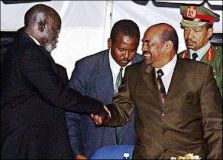Sudan’s new government delayed one month
KHARTOUM, June 9 (Reuters) – Sudan’s new government will be formed a month later than scheduled on August 9 because of delays in creating a new constitution, officials in the constitutional commission said on Thursday.

|
|
Sudanese President Omar El Bashir (R) shakes hands with the leader of Sudan’s People Liberation Movement/Army John Garang after the signing of accords on two outstanding issues paving the way for the signing of a comprehensive peace deal. (AFP) |
The Sudanese government signed a peace deal in January with the former rebel Sudan People’s Liberation Movement (SPLM) ending more than two decades of civil war in the south.
A new government was due to be formed within six months of that deal, or by July 9.
For the past 6 weeks, the constitutional commission, made up mostly of the SPLM and the ruling National Congress Party since many of the main opposition parties refused to take part, has been drafting a new constitution.
Yasir Arman, SPLM spokesman for the commission said on Thursday the constitution will be approved by July 9 and the presidency will be sworn in.
“Within one month of that, according to the (new) constitution, a government of national unity … will be formed to mark the start of a new period in Sudanese history,” Arman told reporters in Khartoum.
Arman said Omar Hassan al-Bashir would be president, SPLM leader John Garang would be first vice president and Ali Osman Mohamed Taha would be the second vice president.
The NCP spokesman for the commission said the delay in the formation of the government did not contravene the peace deal.
“After the adoption of the constitutional text, the president of the republic and the first vice president will be sworn in and then they will have a period of 30 days to start forming the government of national unity,” al-Dirdiry Mohamed Ahmed said.
The SPLM did not go to Khartoum to start work on forming the new government for months after the peace deal was signed on January 9. They said this was due to arrangements and logistical problems in transforming from a military movement into a political party.
Arman said the SPLM would participate in government and help build war-weary Sudan with the same enthusiasm with which it fought Africa’s longest civil war.
The fighting claimed more than 2 million lives and forced more than 4 million from their homes.
